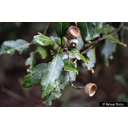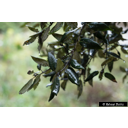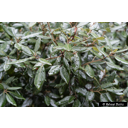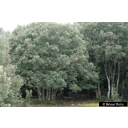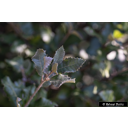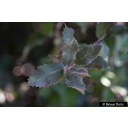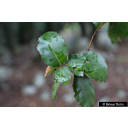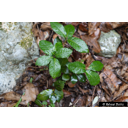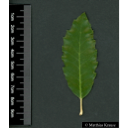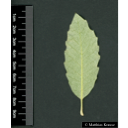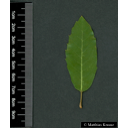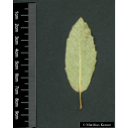Useful information about the taxon (species, subspecies, variety...)
Quercus ilex L. 1753
Fagaceae
(APG IV)holm oak, holly oak, evergreen oak
Taxon concept: The Plant List (2014), version 1.1
Distribution: Europe: Iberian Peninsula, France, Apennines, the Balkans; Turkey, northwestern Africa: Morocco, Algeria, Tunisia and Libya; naturalised: Switzerland, British Isles, Crimea
Size: 5 - 25 (m)
Flowering period: IV - V
Quercus ilex L. - Accepted: Quercus ilex L. bei Zander 2008; Familie: Fagaceae (Zander 2008)Quercus ilex L. - Accepted: Quercus ilex L. bei The Plant List (2014), version 1.1; Familie: Fagaceae (APG III)Quercus ilex L. - Accepted: Quercus ilex L. bei Zander 2008; Familie: Fagaceae (APG IV)Quercus ilex L. - Accepted: Quercus ilex L. bei BfN Checklist Flora DE; Familie: Fagaceae (APG IV)Quercus ilex L. - Accepted: Quercus ilex L. bei World Flora Online; Familie: Fagaceae (APG IV)
- Flowers
- monoecious species
- Flower ecology
- wind-pollinated (anemophilous)
- Life form
- tree or shrub
- Leaves
- coriaceous, lanceolate to ovate leaves
- Foliage persistence
- evergreen
- Fruits
- acorns are brown in colour and 1.5-2 cm long
- Fruit ecology
- gravity-dispersed (barochorous) and animal-dispersed (zoochorous)
- Soil conditions
- preferentially on siliceous or calcareous mobile substrates
- Natural occurrence (habitat)
- Mediterranean, montanous shrublands (Matorral), maquis vegetation, coniferous pre-forests (typically with Aleppo pine [Pinus halepensis Mill.])
- Vegetation typ and synecology (plant community)
- warm-temperate broad-leaved evergreen sclerophylluous forests, woodlands and shrubs; in associations of the Junipero thuriferae-Quercion and Rhamno-Quercion cocciferae
- Constraints according radiation (light)
- shade-tolerant
- Life span
- long-lived species (to more than 1,000 years)
- Usage
- wood is used for carpentry tools; wood can also be used for firewood and for the production of charcoal; a powder made from the bark is used for the hemostasis and healing of lesions and wounds
Erhardt, W., Götz, E., Bödeker, N. & Seybold, S. (2008): Der große Zander. Enzyklopädie der Pflanzennamen. Band 2. Arten und Sorten. Eugen Ulmer KG, Stuttgart (Hohenheim), 18. Aufl., 2103 S.; The International Plant Names Index (2009). Published on the Internet http://www.ipni.org; Courtesy to IPNI, 2009. Exported from IPNI at date: 2009-09-22 20:17:51;
Diese Webseite verwendet Google Maps, um Karten und Standorte von Pflanzen in den Hohenheimer Gärten anzuzeigen. Dadurch werden unter Umständen Daten an Google weitergeleitet, was mit einer Verarbeitung Ihrer personenbezogenen Daten verbunden sein kann. Die Datenschutzerklärung von Google finden Sie hier: Datenschutzerklärung von Google
| Sex | Standort | Accession number | Planting year | Donation | IPEN | Lat. | Long. |
|---|---|---|---|---|---|---|---|
| Exotischer Garten | EG-18068 | ES-0-HOH-SYS-18068 | 0 | 0 | |||
| Exotischer Garten | EG-18069 | ES-0-HOH-SYS-18069 | 0 | 0 | |||
| Parzelle B | EG-B-111-18224 | 1983 | XX-0-HOH-EG-B-111-18224 | 48,7104818164 | 9,2083248141 | ||
| Parzelle N | SP-NB-104-17031 | 2016 | XX-0-HOH-SP-NB-104-17031 | 48,7117813998 | 9,2165393664 | ||
| Gehölz | SYS-G-014-2970 | XX-0-HOH-SYS-G-014-2970 | 48,708732 | 9,211216 |

